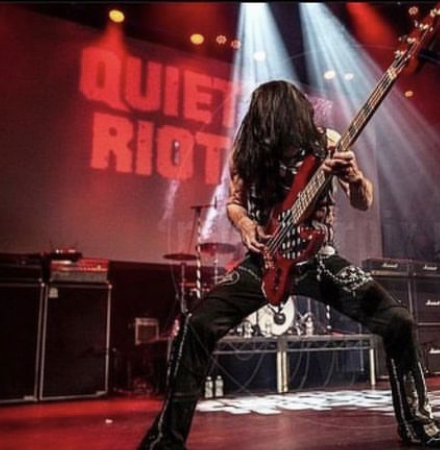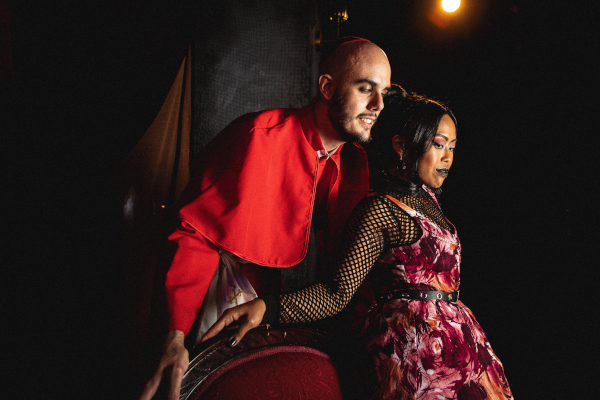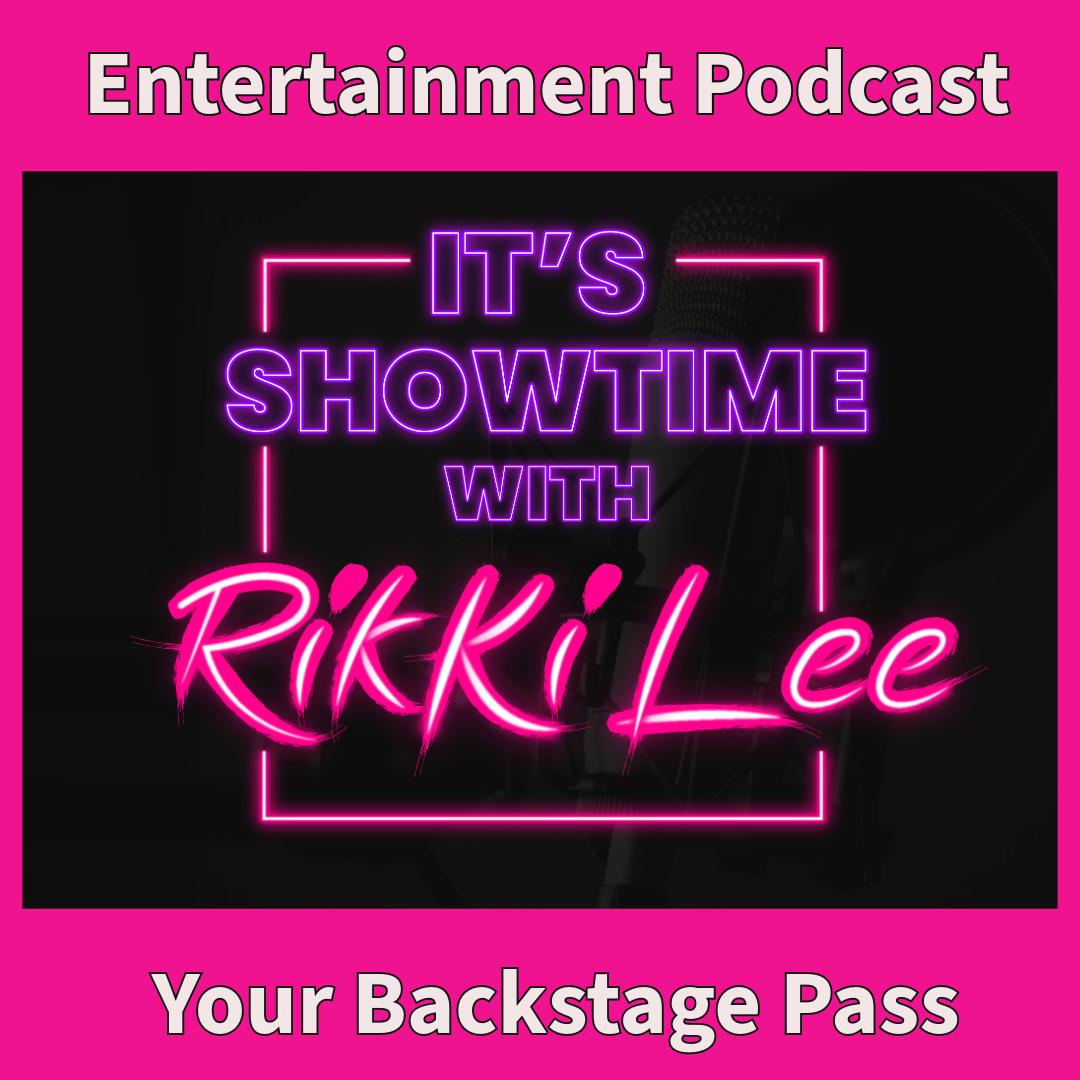by Rikki Lee Travolta
I’ve been involved in entertainment most of my life. I started performing professionally as a young child, before that I was the kid putting on shows for the neighborhood in my garage.
So, I know a little bit about the thrill of being on stage and connecting to an audience. It’s a high as euphoric as a designer drug, but without the chemical afterburn. When you get in that zone, you go to a different place in your head. It is a state of pure bliss that is as intense as a night of passion.
Rudy Sarzo has achieved the pinnacle of fame as one of the premier bass players in heavy metal. Rudy rose to fame with Randy Rhoads in Quiet Riot, then transitioned alongside the guitar virtuoso to be the firepower for Ozzy Osbourne’s solo career.
Over the years Sarzo has been recruited to play with Whitesnake, Dio, Blue Oyster Cult, Geoff Tate’s Queensrÿche, the Guess Who, Yngwie Malmsteen, and Devil City Angels with Rikki Rockett and Tracii Guns.

Rudy returned to Quiet Riot in 2021 and has been tearing it up with the band in live shows around the world. He is still as vital and his playing is still as powerful as in his heyday when he won Top Bassist of the Year honors from Circus Magazine.
When I sat down recently to interview Rudy about being back in the fold with Quiet Riot, I was in for lesson from a scholar of the music industry.
It’s Showtime with Rikki Lee is a radio show about the entertainment industry, with guests ranging from Hollywood A-listers to the biggest names in music, as well as up-and-coming artists. We try to make the show a blend of playful fun with just the right touch of journalistic integrity. At least that’s what we try to do.
The program is now a top-rated podcast as well. We are currently in the Top 225 of all entertainment news shows on the Apple Podcasts platform.
Every interview is unique. I don’t take a cookie-cutter approach. I try to focus the show on the guest and what makes them special as an individual.
I start off each show by introducing my guest and a description of what I plan to cover in the interview. When I sat down with Rudy Sarzo, I was prepared to lead him through questions that would give listeners a complete career retrospective.
Humorously, the introduction I offer on the It’s Showtime with Rikki Lee episode featuring Rudy laments on a lot of things that we actually don’t end up covering. Yet, it’s still a great interview. In fact, by not sticking to the script, the interview is actually really amazing and super informative.
Basically, it came down to one question – why do you do it?

Rudy Sarzo has been a star in the music industry longer than I have been out of diapers. My mother would be proud to tell you that I’ve successfully been out of diapers for quite some time now.
Interviewing a legend like Rudy is a bit intimidating. And, if I sound a little bit out of sorts in the interview, there’s a reason why.
On the way to the radio station to do the interview, my cell phone died. It didn’t run out of battery power. It died. It wouldn’t even turn on when plugged directly into a USB port. Alas, it was never to work again.
I’d confirmed the interview the day before with Rudy. But I now was without my phone as I headed into the studio. Like many people, my phone is my passport to the outside world. I would be hard-pressed to tell you anyone’s phone number or email address from memory.
Everything seemed okay, but then, right when we were supposed to connect with Rudy over the Internet, the radio station’s entire system crashed. Such computer systems don’t reboot quickly, either.
So, there I am knowing that I have the legendary Rudy Sarzo standing by expecting to be talking to me. And with no phone, I have no way to call or email him to let him know we’re delayed.
I take timeliness very seriously. I don’t commit to appointments I can’t keep. In fact, I travel with a book because I am early to almost every meeting. Yet there I was looking like the ultimate flake.
Feeling the minutes tick by as the system rebooted, my heart was racing. I know it was beyond my control, but I was embarrassed. I simply don’t keep people waiting.
Eventually, everything worked out, but I was definitely still unsettled.
Rudy is one of the nicest and most down-to-earth spirits in heavy metal. However, he is also one of the most accomplished bass players in the history of heavy metal – so when you talk to him, you know you’re in the presence of greatness.
I pride myself on my ability to adapt my interview style to each guest in order to pull the best stories out of them. For Rudy, I found the best approach was to just put a mic in front of the living legend and get out of the way.
Rudy has been doing this a long time. I realized right away that he is a man who knows exactly what he wants to say.
As Rudy points out early in our talk, he is the only musician who ever played with Randy Rhoads in both Quiet Riot and with Ozzy Osbourne. It gives him a very unique perspective on the guitarist many consider to be the greatest to ever let their fingers fly over a fretboard.
A great deal of our interview is focused on Rudy’s time playing with Randy and the influence the late guitarist had on the music industry. It’s a subject area that is also covered in significant detail in Rudy’s book Off the Rails. The book primarily details Rudy’s memories of playing alongside Randy Rhoads in the early stages of Ozzy Osbourne’s solo career.

Anyone interested in the history of heavy metal, and in particular what it was like playing with Randy Rhoads and other greats in the industry, is going to be fascinated by my interview with Rudy.
One of the things Rudy focuses on when talking about Randy is how Rhoads had a laser focus when it came to the study of music. He points out that Randy was a classically trained guitarist who switched to rock n’ roll because he wanted to hang out with kids his own age.
“He’s the only musician I’ve ever played with that both parents were actually professors,” explains Rudy during out talk. This led him to spend every day trying to become a better musician.
“We never spoke about politics, religion, or who was going out with who,” says Rudy about his days writing and playing songs with Rhoads. It was always all about the music.
Rudy goes on to say that of all the artists he’s worked with over the years, nobody has matched Randy’s focus. The one artist that Rudy says came closest to Randy in the intensity of his approach to perfecting the music was the late singer Ronnie James Dio.
The influence of Randy Rhoads as a guitarist, explains Rudy, is still strong today. Rudy still gets messages from young guitar players just discovering the classic recordings of Rhoads. In many cases, the young musicians are shocked to learn that the guitar master on their recordings has passed.
Rudy and Randy played together in the early days of Quiet Riot, then again with Ozzy Osbourne. After Randy died in a plane crash in 1982, Rudy rejoined Quiet Riot and helped guide the band to hits like “Metal Health (Bang Your Head)” and “Cum on Feel the Noize”. The album Metal Health was the first heavy metal album to hit the number one spot on the Billboard charts.

Quiet Riot is still a huge draw. They put on amazing live shows, and the single “I Can’t Hold On” featuring the late Kevin DuBrow and Frankie Banali is not only musically brilliant but also touches the heart. It’s a song that DuBrow originally started writing about Rhoads moving from Quiet Riot to Ozzy’s band and later finished with guitarist Alex Grossi – who has been the axe man for Quiet Riot since 2004.
Featured on the album Rehab: Relapse and Remastered, the song has hit the sweet spot with music fans. Outsider Rack calls the song “one of the best things the band ever recorded.”
Of course, if I told you everything that Rudy and I talk about in our interview, then it would sure take the fun out of listening to it. So pick out your favorite podcast app and check it out.
It’s Showtime with Rikki Lee is available now to listeners around the world as a top-rated podcast on Apple, iHeartRadio, Spotify, Google, Amazon, and all other major podcast platforms.




